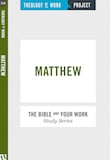“Blessed Are Those Who Mourn, for They Will be Comforted” (Matthew 5:4)
Bible Commentary / Produced by TOW Project
The second beatitude builds on our mental recognition of our poverty of spirit by adding an emotional response of sorrow. When we face the evil in our own lives, it saddens us; when we face the evil in the world—which includes possible evil in our workplace—that, too, touches our emotions with grief. The evil may come from ourselves, from others, or from sources unknown. In any case, when we honestly mourn evil words, evil deeds, evil policies on the job, God sees our sorrow and comforts us with the knowledge that it will not always be this way.
Those blessed with mourning about their own failings can receive comfort by admitting their errors. If we make a mistake with a colleague, student, customer, employee, or other person, we admit it and ask their pardon. This takes courage! Without the emotional blessing of sadness over our actions, we would probably never muster the guts to admit our mistakes. But if we do, we may be surprised how often people are ready to forgive us. And if, on occasion, others take advantage of our admission of fault, we can fall back on the blessing of non-arrogance that flows from the first beatitudes.
Some businesses have found expressing sorrow to be an effective way to operate. Toro, the manufacturer of tractors and lawn equipment, adopted a practice of showing concern to people injured while using their products. As soon as the company learns of an injury, it contacts the injured person to express sorrow and offer help. It also asks for suggestions to improve the product. Surprising as it may sound, this approach has reduced the number of customer lawsuits over a period of many years.[1] Virginia Mason Hospital found similar results from acknowledging their role in patient deaths.[2]








